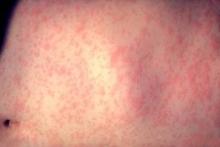With European measles cases at more than 28,000 so far this year, the World Health Organization and the European Center for Disease Prevention and Control acknowledge that Europe’s goal of eliminating measles by 2015 – a deadline already extended from 2010 – is looking increasingly remote.
Instead, WHO now says, "a truly [European] region-wide epidemic is underway," thanks to suboptimal vaccine coverage in large swaths of western Europe. More than half of this year’s measles cases, and the lion’s share of recorded measles fatalities, are in France.
Now, WHO and ECDC are targeting clinicians in their efforts to stem the measles tide, finding them both part of the problem and the likeliest hope of a solution.
"Providers hold the information parents want," said Robb Butler, a WHO technical officer developing communications strategies for increasing uptake of measles, mumps, and rubella vaccine (MMR) in Europe. "They’re also agents of change. But having information and being agents of change require different skills." The latter, he said, "is the piece that may be missing at the moment."
Writing in the journal Eurosurveillance late last month, Dr. Pier Luigi Lopalco, head of the ECDC’s vaccine-preventable diseases program, and ECDC director Marc Sprenger made a case that pediatricians and family practice physicians made up "the backbone" of MMR programs in the EU (Euro. Surveill. 2011;16:pii 19979). They also cited a study that found clinicians to be more trusted sources of vaccination information than governments (Vaccine 2010;28:4235-48). And yet clinicians, they argued, weren’t advocating effectively for vaccination.
In their editorial, Dr. Lopalco and Dr. Sprenger cited a 10-year old study from France’s public health agency suggesting that a significant minority of French family doctors were not, in fact, strongly supportive of MMR vaccinations; this message, they surmised, may have rubbed off in recent years. However, they also cited a more recent U.K. study in which clinicians who delivered pro-vaccination messages too stridently were questioned by patients about their motives (BMC Public Health 2007;7:42), suggesting that the problem was more complex.
Mr. Butler said that clinicians aren’t always natural communicators and that fast improvement on this front will be essential to meeting vaccination coverage goals.
"For the most part, it’s not about providers being convinced," he said. "It’s about how to better package the message." Often, clinicians and other health care workers find themselves too busy, he said, to engage in the type of dialogue that is needed to increase uptake among the 5%-20% of people reluctant to vaccinate.
Clinicians "can put things in technical terms expertly, and can sit in workshops and tell you every last thing about the safety of the MMR vaccines," Mr. Butler said, but something may not be translating in the clinic.
Mr. Butler said that that WHO’s efforts to engage physicians are part of a revamping of its approach to MMR outreach that focuses less on broadly informing the general population and more on pinpointing areas where the message hasn’t penetrated. "We’ll never reach the goal of measles elimination with traditional information campaigns alone," he said.
One of WHO’s new communications strategies for MMR involves using the Internet and social media to identify physicians skeptical of MMR or who have trouble encouraging uptake, and to engage them, Mr. Butler said. "We’re bringing provider focus into the spotlight," he said. "But it’s crucial that we now act upon it, to be a voice for them, and to talk to them about their barriers and their concerns."
So far WHO’s new-media strategies have been aimed at English- and Russian-speaking communities. Mr. Butler also said that his WHO team, along with representatives from ECDC, is planning a mission to France this year, he said, to talk about novel communications strategies there for MMR, including clinician concerns.
"Editorials are good and well," Mr. Butler said. "But now we need their side of the story."


